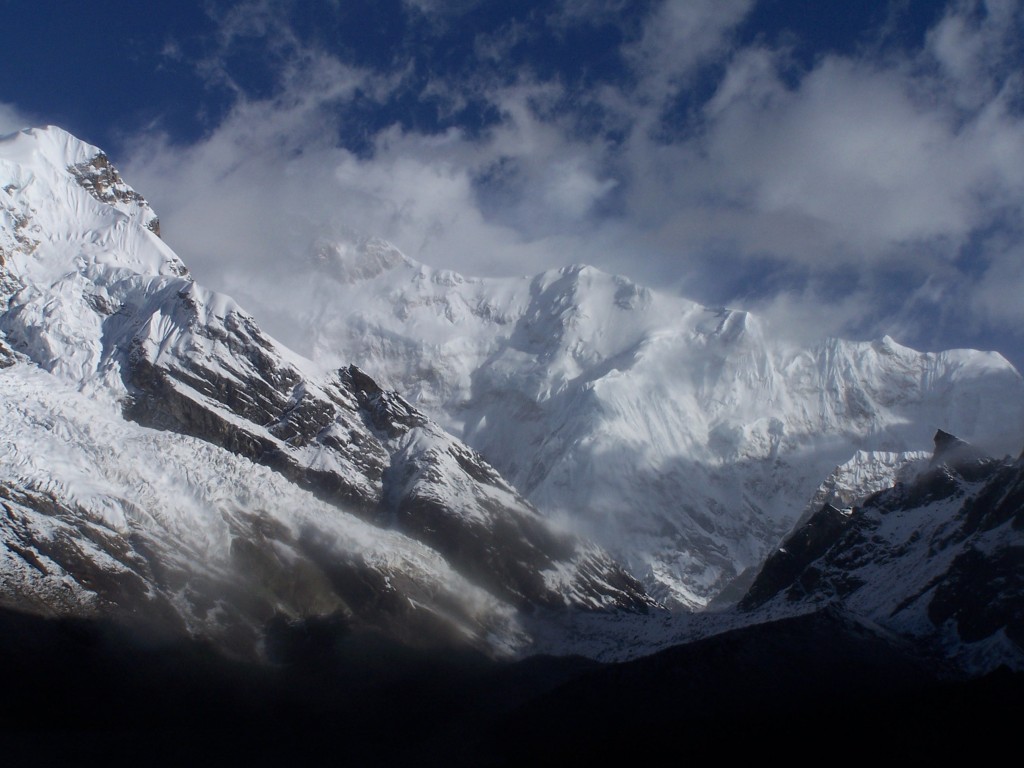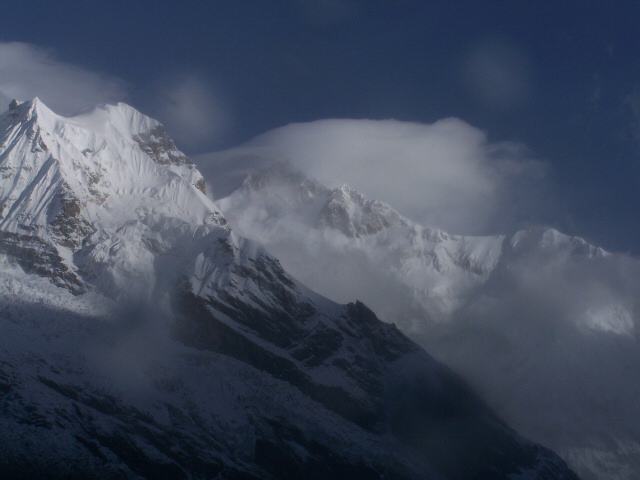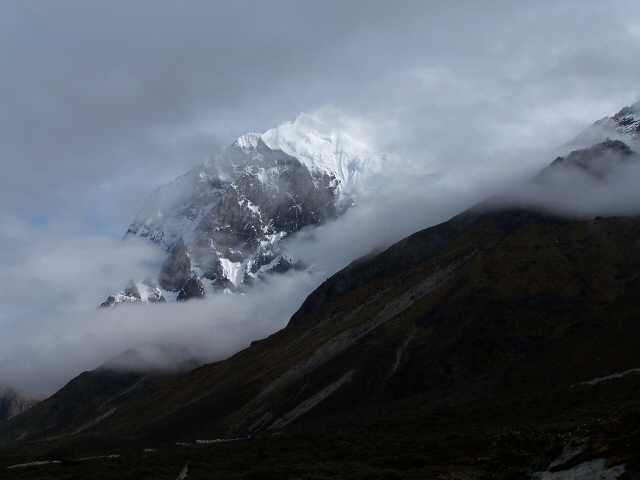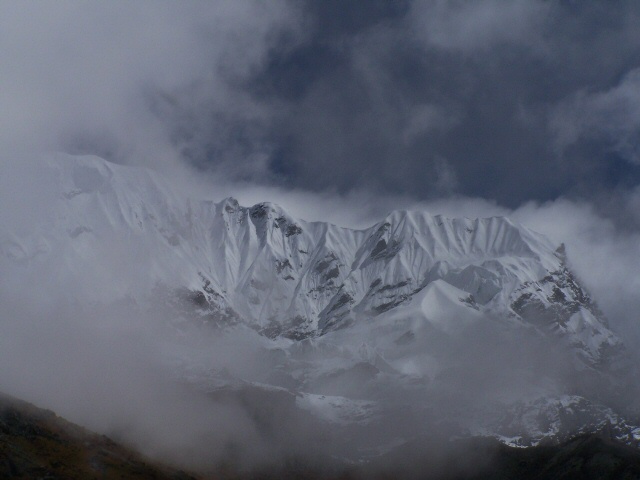The sky is all taunt and taskmaster, even though I’m closer to it than I’ve ever been. Or maybe because I’m closer to it than I’ve ever been. The air is thrilling, illusive, a blade that sings without a sound. I and my sister trekkers gulp it down as we climb well before dawn—4 a.m., to be exact—to reach the highest point of our eight-day trek and be rewarded, hopefully, by the most spectacular in a week of spectacular views before the day’s usual clouds set in.
We camped last night at over 14,000 feet, after five days of almost steady climbing, although we took one day off to rest and acclimate when we reached 12,500 feet. We made our way through dense vegetation at first, tall trees lining our paths and the rivers we crossed. Then rhododendrons, a whole day of them, their leaves deep red in the early October sun. Plant life thinned as we climbed, trees turning to bush which then turned to scrub. The tree line is very high in this part of the world, Sikkim, a little sleeve of India, once a separate country tucked between Bhutan and Nepal.
When the sun peeks through the almost constant cloud cover, especially in early mornings, we are surrounded by white peaks, whole walls of white that make me feel I’m at a remote northern reach, even though Sikkim lies at a latitude similar to that of central Florida, closer to the equator than most of the United States. Now, as we trek through the dark in our good hiking boots and headlamps, there is scant vegetation to interfere with our climbing. But the step-like rocks give us enough to work with, as does the air itself, an odd mixture of presence and absence that keeps me focused on my breathing the way I’ve never managed to do in a yoga class.
I have skied and hiked in high places, but this is the first time I’ve experienced the altitude as a personality, as something to negotiate. I’m not uncomfortable, exactly; rather in something of an altered state, aware of what every muscle is doing, and focusing on one rock at a time. I place my each foot just so, not wanting to waste any energy regaining my balance. And then there’s the fatigue, a feeling of being packed in cotton, all excess tamped down. For once, none of us have social energy to spare, even though we are eight women from Moab, Salt Lake City, and Taos, middle-aged athletes and power-shoppers who normally have plenty to say.
We climb silently through darkness that begins to lift now, only to reveal thick mist and cloud cover. Not a good sign. Normally dawn is clear in this part of the Himalayas, and already we have gotten a few early-morning glimpses of Mt.Pandim, the third highest peak in the world, a mass of blinding white that is sacred to the Buddhists of Sikkim and said to be unclimbable. Our goal today, and perhaps the goal of our entire eight-day trek, is to get an unprecedented view of this mountain whose presence all week has beckoned and then disappeared into mid-morning clouds.
The dawn grows brighter, but not bright enough. We have arrived at our lookout point at 16,500 feet, the light grey around us and rain beginning to sprinkle, then fall with conviction. Our guide Namgayl pulls on a bright blue poncho, and our Sherpa helpers don their own red, yellow, grey, and blue rainwear before handing around mugs of tea, hardboiled eggs, apples, and brown breadlike slabs of something thick, sweet, unrecognizable and sustaining, which they baked the night before. Never has an egg tasted so good. And the tea, lemony and sweet. As for the apple—by now I trust that it has been washed in thoroughly boiled water, and I take a huge, thirsty bites, feeling none of my earlier fears of contracting something ugly.
We are all bent over our breakfasts like this, chattering again, energized and even happy while the rain pelts down, when one of the women suddenly gives a cry and points behind us. The clouds have broken just over Mt.Pandim, and now it hovers larger than I could have imagined, so close it seems to be breathing over us. We feel held in something like a kind hand made of air and sky, a hand that has parted those clouds just for us, just for these moments, as we stand in the rain three miles above the earth’s floor. The mountain seems to bless us, dwarfing us and then offering all of its calm self, its whiteness, its unconquerable splendor. We offer back our silence. And our tears.
—Leslie Ullman
Leslie Ullman is the author of four poetry collections, most recently Progress on the Subject of Immensity published by University of New Mexico Press in 2013. Her awards include the Yale Series of Younger Poets Award, the Iowa Poetry Prize, and two NEA Fellowships. Now professor Emerita at University of Texas El Paso, where she taught for 27 years, she continues to teach in the low-residency MFA Program at Vermont College of the Fine Arts. For the past eight winters she also worked as a full-time ski instructor at Taos Ski Valley in northern New Mexico.





Stunning! I read this as I cuddled up in bed. A perfect bedtime story. “Mt Pandim … it seems to be breathing over us.” So Sweet. Thanks, Leslie.
I love the phrase: “something to negotiate”….& “3 miles above the earth’s floor. Wow! What kept you from falling into Heaven?
You are brave and I am envious…thanks for the article.
Beautiful. Each word counts.
I especially appreciate the concept of “the altitude as a personality,” which demonstrates how Ullman is in dialogue with the *life* of this landscape–so different from our usual associations. Thanks!